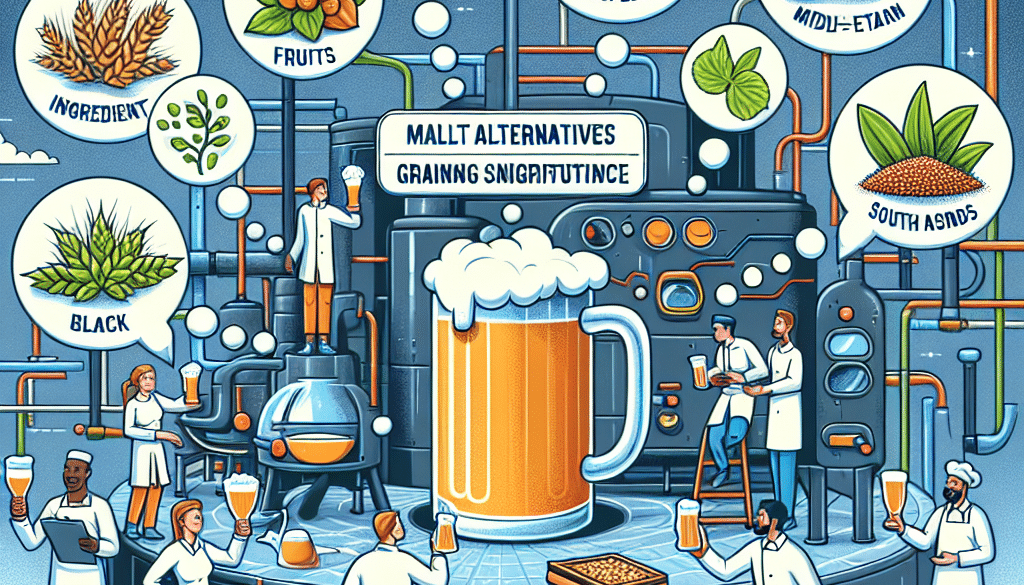Beer Brewing’s Future: Malt Alternatives’ Growing Influence
-
Table of Contents
- Beer Brewing’s Future: The Rise of Malt Alternatives
- The Role of Malt in Traditional Beer Brewing
- Environmental and Economic Drivers for Malt Alternatives
- Emerging Malt Alternatives in Beer Brewing
- Case Studies: Pioneers of Malt Alternative Brewing
- Technological Advances Supporting Malt Alternatives
- Consumer Trends and Market Growth
- Conclusion: The Future of Beer Brewing with Malt Alternatives
- ETChem’s Protein Products: Enhancing Beer Brewing
Beer Brewing’s Future: The Rise of Malt Alternatives
The craft of beer brewing has been evolving for thousands of years, with each era bringing its own innovations and styles. In recent times, one of the most significant shifts in the brewing industry has been the exploration and adoption of malt alternatives. These alternatives are not only changing the flavor profiles of beers but are also responding to environmental concerns, dietary preferences, and the need for sustainable practices. This article delves into the growing influence of malt alternatives in beer brewing and what it means for the future of this beloved beverage.
The Role of Malt in Traditional Beer Brewing
Malt has been the backbone of beer brewing for centuries. It is responsible for providing the essential sugars needed for fermentation, contributing to the beer’s color, and influencing the overall flavor. Malt is typically made from barley, which is soaked, germinated, and then dried in a process known as malting. However, as the brewing industry looks to the future, the limitations of traditional malt have prompted a search for innovative alternatives.
Environmental and Economic Drivers for Malt Alternatives
Several factors are driving the search for malt substitutes in beer brewing. Climate change is affecting barley yields, making the crop more susceptible to extreme weather conditions and diseases. This volatility can lead to unpredictable malt prices and availability. Additionally, the malting process is energy-intensive, contributing to the industry’s carbon footprint. As a result, brewers are seeking more sustainable and cost-effective ingredients that can mimic or even enhance the qualities of traditional malt.
Emerging Malt Alternatives in Beer Brewing
As brewers experiment with different grains and adjuncts, a variety of malt alternatives have come to the forefront:
- Rice and Corn: These grains are often used in lighter beers to provide fermentable sugars without adding much color or flavor.
- Oats and Wheat: Popular in hazy IPAs and stouts, these grains contribute to a beer’s body and mouthfeel.
- Rye: Known for its spicy notes, rye adds complexity to a beer’s flavor profile.
- Millet and Sorghum: These gluten-free grains are essential for crafting beers that are safe for those with gluten sensitivities or celiac disease.
- Quinoa and Buckwheat: These pseudocereals are gaining popularity for their unique flavors and nutritional profiles.
Each alternative brings its own set of challenges and benefits to the brewing process, and their use is often dictated by the desired outcome of the beer being produced.
Case Studies: Pioneers of Malt Alternative Brewing
Several breweries have already made significant strides in using malt alternatives. For example, Ghostfish Brewing Company specializes in gluten-free beers, using millet, buckwheat, and brown rice to create award-winning brews. Another example is Dogfish Head Craft Brewery, which has experimented with ancient grains like amaranth, quinoa, and spelt in their quest for unique flavors.
These case studies demonstrate that malt alternatives can not only meet the needs of those with dietary restrictions but can also push the boundaries of traditional beer flavors, creating new and exciting products for consumers.
Technological Advances Supporting Malt Alternatives
Advancements in brewing technology have made it easier for brewers to work with malt alternatives. Modern malting equipment, precise fermentation control systems, and innovative enzymes are helping brewers overcome the challenges associated with alternative grains, such as different sugar profiles and potential processing difficulties.
Furthermore, research into new yeast strains and fermentation techniques is opening up possibilities for creating beers with malt alternatives that were once thought impossible.
Consumer Trends and Market Growth
The demand for beers made with malt alternatives is on the rise, driven by health-conscious consumers and those with dietary restrictions. The gluten-free beer market, in particular, has seen significant growth, with more breweries offering gluten-free or reduced-gluten options. Additionally, the trend towards sustainable and locally sourced ingredients is encouraging brewers to consider alternative grains that can be grown with a lower environmental impact.
Conclusion: The Future of Beer Brewing with Malt Alternatives
The growing influence of malt alternatives in beer brewing is a testament to the industry’s adaptability and commitment to innovation. As brewers continue to explore the potential of these alternatives, we can expect a more diverse range of flavors and styles, as well as beers that are more environmentally sustainable and inclusive for all consumers. The future of beer brewing looks bright, with malt alternatives playing a key role in shaping its evolution.
ETChem’s Protein Products: Enhancing Beer Brewing
In addition to malt alternatives, protein products are also making an impact in the brewing industry. ETChem’s protein offerings, such as their high-quality collagen products, can be used to improve the nutritional profile of beers without compromising on taste or quality. Their range of collagens is suitable for various applications, including fortifying beers to cater to health-conscious consumers. With ETChem’s commitment to quality and sustainability, breweries can confidently incorporate these protein products into their brewing processes.
About ETChem:
ETChem, a reputable Chinese Collagen factory manufacturer and supplier, is renowned for producing, stocking, exporting, and delivering the highest quality collagens. They include marine collagen, fish collagen, bovine collagen, chicken collagen, type I collagen, type II collagen and type III collagen etc. Their offerings, characterized by a neutral taste, instant solubility attributes, cater to a diverse range of industries. They serve nutraceutical, pharmaceutical, cosmeceutical, veterinary, as well as food and beverage finished product distributors, traders, and manufacturers across Europe, USA, Canada, Australia, Thailand, Japan, Korea, Brazil, and Chile, among others.
ETChem specialization includes exporting and delivering tailor-made collagen powder and finished collagen nutritional supplements. Their extensive product range covers sectors like Food and Beverage, Sports Nutrition, Weight Management, Dietary Supplements, Health and Wellness Products, ensuring comprehensive solutions to meet all your protein needs.
As a trusted company by leading global food and beverage brands and Fortune 500 companies, ETChem reinforces China’s reputation in the global arena. For more information or to sample their products, please contact them and email karen(at)et-chem.com today.





